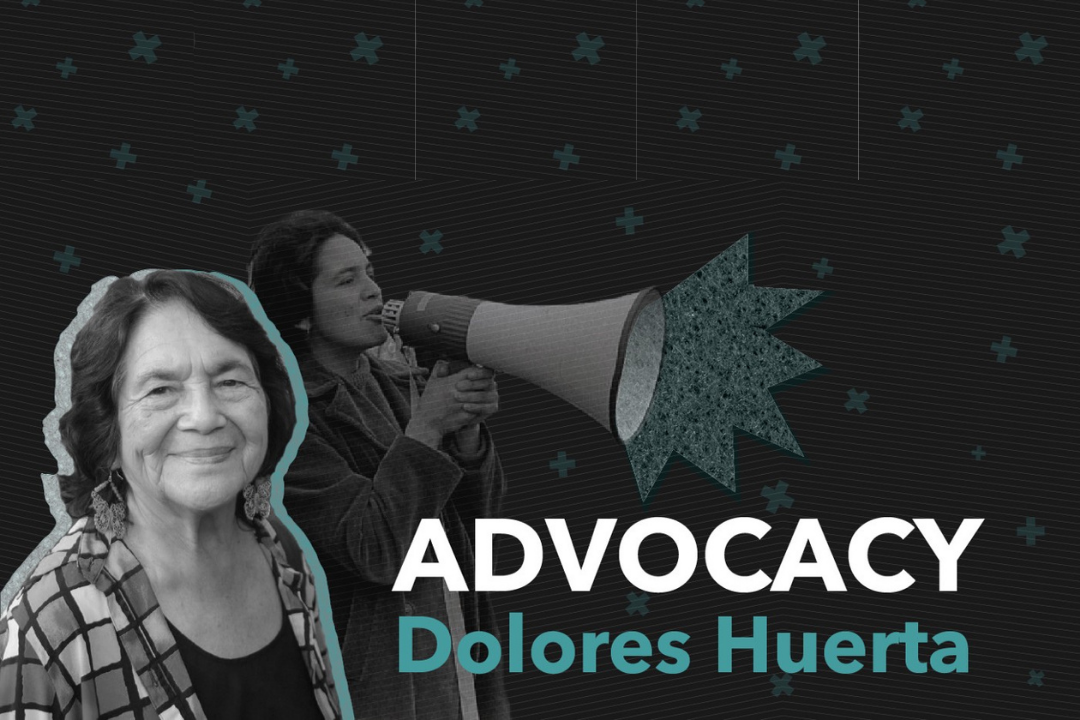Written by: Dayani Guevara, Cisneros Class of 2024
“¡Sí se puede!”
This rallying cry, meaning, “Yes, we can,” has inspired and motivated many social movements and protests. Dolores Huerta, a revolutionary Mexican-American activist, coined the phrase in 1972 while protesting brutal working conditions for migrant farm workers in Arizona. For decades, Dolores has mobilized migrant farm workers across the U.S. to fight for their rights and has been steadfast in her beliefs as she continues to advocate for marginalized people. Not only has Dolores been a champion for the Hispanic community, but she has also been a fierce advocate for women’s rights. During Hispanic Heritage Month, we celebrate Dolores Huerta for her leadership and unwavering dedication to labor rights, civil rights, and the feminist movement.
Dolores’ fight for equality began when she was an elementary school teacher in a community of mostly migrant farm workers.
Witnessing her students attend school hungry and half-clothed, Dolores found it difficult to stay silent. Because a majority of migrant workers weren’t proficient in English and didn’t know their rights or due process, crop producers frequently took advantage of migrants by severely underpaying them. Her students’ parents couldn’t afford basic necessities for their families. Dolores left teaching, stating “I couldn’t tolerate seeing kids come to class hungry and needing shoes. I thought I could do more by organizing farm workers than by trying to teach their hungry children.”
This vision prompted her to organize a farm worker strike to demand better working conditions. Their demands included things that today we take for granted, like work breaks, restroom areas, and wages higher than 70 cents an hour. Dolores developed a following and soon thereafter met Cesar Chavez, a fellow civil rights activist. Their shared vision of bettering the lives of migrant farm workers resulted in the creation of the National Farm Workers Association, which aims to regulate safety conditions and ban gender discrimination. The National Farm Workers Association has since been able to secure overtime pay, ban the use of lethal pesticides, and provide parental leave for migrant farm workers.
Even though Dolores was advocating for marginalized workers, she still faced sexism from both the people she was advocating for, as well as the establishments she was fighting against. She was heavily criticized for being divorced, having 11 children, and speaking out at a time when women were expected to be submissive. The discrimination Dolores faced allowed her to connect and relate with activists outside the labor movement. Her collaboration with famous feminists, such as Gloria Steinem, helped make both movements more intersectional. Dolores has been quoted as saying, “Look at our women, they are strong, you can feel it. They are the rocks on which we really build.” Not only did Dolores withstand regular verbal abuse during her peaceful protests, but she also endured physical abuse at the hands of a police officer who once beat her so badly, she was sent to the hospital for broken ribs and the emergency removal of her damaged spleen. Dolores saw women as the backbone of any successful revolution — and she was no exception.
Dolores has been recognized multiple times for her work in activism. For example, in 1998, she was awarded the Eleanor Roosevelt Award for Human Rights. In 2012, President Barack Obama awarded her the Presidential Medal of Freedom, which is the highest honor that can be bestowed to a civilian. He spoke of her accomplishments and has been quoted as saying that Dolores has “fought to give people a seat at the table.” Dolores Huerta is still fighting for justice. Proving to all of us that no matter your age, when it comes to creating positive change in the world, sí se puede.
Dayani Guevara is a first-year Cisneros Scholar in the Elliott School of International Affairs. From Fort Wayne, Indiana, she is pursing international affairs and is part of GW’s Women’s Leadership Program. Dayani’s views are her own and not necessarily reflective of the Cisneros Institute.


